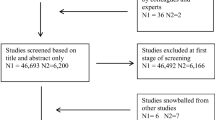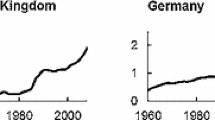Abstract
This paper develops a method to decompose differences across distributions of household income, based on counterfactual distributions that ‘lie between’ the actually observed distributions. Our approach decomposes differences between any two income distributions (or functionals such as inequality or poverty measures) into shares due to price effects; occupational structure effects; and endowment effects. Comparing the household income distributions of the USA and Brazil in 1999, we find that most of Brazil’s excess inequality (of 13 Gini points) is accounted for by underlying inequalities in the distributions of education and of non-labor income, notably pensions (between four and six Gini points each). Steeper returns to education in Brazil also make an important contribution (of two to five points). Differences in occupational structure and in racial and demographic composition are much less important.
Similar content being viewed by others
References
Alesina, Alberto, Angeletos, George-Marios: Fairness and redistribution: US versus Europe. Am. Econ. Rev. 95(4), 960–980 (2005)
Almeida dos Reis, José G., Paes de Barros, Ricardo: Wage inequality and the distribution of education: A study of the evolution of regional differences in inequality in metropolitan Brazil. J. Dev. Econ. 36, 117–143 (1991)
Atkinson, Anthony B.: On the measurement of inequality. J. Econ. Theory 2, 244–263 (1970)
Atkinson, Anthony B.: Bringing income distribution in from the cold. Econ. J. 107(441), 297–321 (1997)
Banerjee, Abhijit, Duflo, Esther: Inequality and growth: What can the data say? J. Econ. Growth 8(3), 267–299 (2003)
Banerjee, Abhijit, Newman, Andrew: Occupational choice and the process of development. J. Polit. Econ. 101(2), 274–298 (1993)
Bénabou, Roland: Unequal societies: Income distribution and the social contract. Am. Econ. Rev. 90(1), 96–129 (2000)
Blau, Francine, Khan, Lawrence: International differences in male wage inequality: Institutions versus market forces. J. Polit. Econ. 104(4), 791–837 (1996)
Blinder, Alan S.: Wage discrimination: Reduced form and structural estimates. J. Hum. Resour. 8, 436–455 (1973)
Bourguignon, François: Decomposable income inequality measures. Econometrica 47, 901–920 (1979)
Bourguignon, François, Ferreira, Francisco H.G., Leite, Phillippe: Beyond Oaxaca–Blinder: Accounting for differences in household income distributions across countries. World Bank Policy Research Working Paper 2828, Washington, DC (2002) (April)
Bourguignon, François, Ferreira, Francisco H.G., Lustig, Nora (eds.): The Microeconomics of Income Distribution Dynamics in East Asia and Latin America. The World Bank and Oxford University Press, Washington, DC (2004)
Buhmann, B., Rainwater, L., Schmaus, G., Smeeding, T.: Equivalence scales, well-being, inequality and poverty: Sensitivity estimates across ten countries using the Luxembourg income study database. Rev. Income Wealth 34, 115–142 (1988)
Calmfors, Lars, Driffill, John: Bargaining structure, corporatism and macroeconomic performance. Econ. Policy 6, 14–61 (1988), April
Cowell, Frank A.: On the structure of additive inequality measures. Rev. Econ. Stud. 47, 521–531 (1980)
Cowell, Frank A., Jenkins, Stephen P.: How much inequality can we explain? A methodology and an application to the USA. Econ. J. 105, 421–430 (1995)
DiNardo, John, Fortin, Nicole, Lemieux, Thomas: Labor market institutions and the distribution of wages, 1973–1992: A semi-parametric approach. Econometrica 64(5), 1001–1044 (1996)
Donald, Stephen, Green, David, Paarsch, Harry: Differences in wage distributions between Canada and the United States: An application of a flexible estimator of distribution functions in the presence of covariates. Rev. Econ. Stud. 67, 609–633 (2000)
Engerman, Stanley, Sokoloff, Kenneth: Factor endowments, institutions, and differentials paths of growth among new world economies. In: Haber Stephen (ed.) How Latin America Fell Behind. Stanford University Press, Stanford (1997)
Ferreira, Francisco H.G. (2001): Education for the masses?: The interaction between wealth, educational and political inequalities. Econ. Transit. 9(2), 533–552
Ferreira, Francisco H.G., Lanjouw, Peter, Neri, Marcelo: A robust poverty profile for Brazil using multiple data sources. Rev. Bras. Econ. 57(1), 59-92 (2003)
Forbes, Kristin J.: A reassessment of the relationship between inequality and growth. Am. Econ. Rev. 90(4), 869–887 (2000)
Foster, J., Greer, J., Thorbecke, E.: A class of decomposable poverty measures. Econometrica 52, 761–765 (1984)
Gosling, Amanda, Machin, Steve, Meghir, Costas: The changing distribution of male wages in the UK. Rev. Econ. Stud. 67, 635–686 (2000)
Henriques, Ricardo: Desigualdade e Pobreza no Brasil. IPEA, Rio de Janeiro (2000)
Hoffman, Rodolfo: Desigualdade no Brasil: A Contribuição das Aposentadorias. UNICAMP, Instituto de Economia, mimeo (2001)
Hyslop, Dean R., Maré, Dadid C.: Understanding New Zealand’s changing income distribution, 1983–1998: A semi-parametric analysis. Economica 72, 469–495 (2005)
Juhn, Chinhui, Murphy, Kevin, Pierce, Brooks: Wage inequality and the rise in returns to skill. J. Polit. Econ. 101(3), 410–442 (1993)
Kuznets, Simon: Economic growth and income inequality. Am. Econ. Rev. 45(1), 1–28 (1955)
Lam, David, Levinson, Deborah: Age, experience, and schooling: Decomposing earnings inequality in the United States and Brazil. Sociol. Inq. 62(2), 218–145 (1992)
Lemieux, Thomas: Decomposing changes in wage distributions: A unified approach. Can. J. Econ. 35(4), 646–688 (2002)
Machado, José A.F., Mata, José: Earning functions in Portugal 1982–1994: Evidence from quantile regressions. Empir. Econ. 26(1), 115–134 (2001)
Milanovic, Branko: Income, Inequality, and Poverty during the Transition from Planned to Market Economy. The World Bank, Washington (1998)
Mincer, Jacob: Schooling, Experience, and Earnings. NBER, New York (1974)
Oaxaca, Ronald: Male–female wage differentials in urban labor markets. Int. Econ. Rev. 14, 673–709 (1973)
Ravallion, Martin, Chen, Shaohua: Measuring pro-poor growth. Econ. Lett. 78, 93–99 (2003)
Sacconato, André L., Menezes Filho, Naércio: A Diferença Salarial entre os Trabalhadores Americanos e Brasileiros: Uma Análise com Micro Dados. Universidade de São Paulo, Instituto de Pesquisas Econômicas, TD No. 25/2001 (2001)
Shorrocks, Anthony F.: The class of additively decomposable inequality measures. Econometrica 48, 613–625 (1980)
World Bank: World Development Report 2006: Equity and Development. Oxford University Press and the World Bank, New York (2005)
Author information
Authors and Affiliations
Corresponding author
Additional information
An erratum to this article can be found at http://dx.doi.org/10.1007/s10888-008-9084-1
Rights and permissions
About this article
Cite this article
Bourguignon, F., Ferreira, F.H.G. & Leite, P.G. Beyond Oaxaca–Blinder: Accounting for differences in household income distributions. J Econ Inequal 6, 117–148 (2008). https://doi.org/10.1007/s10888-007-9063-y
Received:
Accepted:
Published:
Issue Date:
DOI: https://doi.org/10.1007/s10888-007-9063-y




